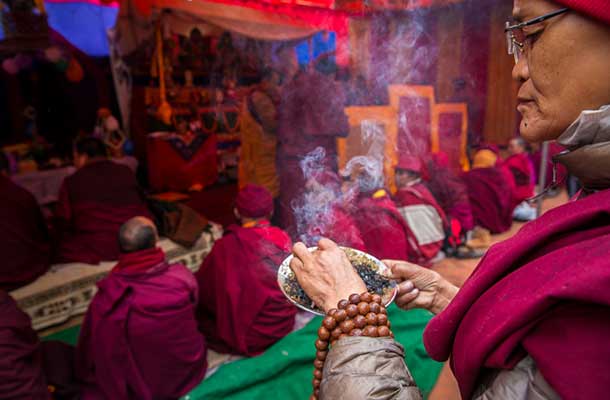Customs and Etiquette in Nepal: 5 Tips for Travelers
Get to know the local customs and learn how to be polite in Nepal with these five tips from Prathap Nair.
 Photo © Mahadev Rojas Toras
Photo © Mahadev Rojas Toras
As a popular tourist destination, Nepal is certainly used to the presence of tourists, so many of the local people are mostly tolerant towards various cultural differences.
Nevertheless, it’s a good idea to keep in mind a few etiquette pointers while interacting with locals and visiting places of religious importance.
- Don’t Reach Out to Shake Hands
- Always Finish Your Food
- Etiquette For Cultural Site Visits
- Respect the Locals
- No Whistling!
Don’t reach out to shake hands
In Nepal, a handshake is not the norm while greeting someone you’ve just met – especially when it’s a member of the opposite sex.
Physical touch is only reserved for friends and relatives while greeting (who would hug each other or touch the elder’s feet when they meet).
Instead, join your hands together and greet people with a ‘Namaste’ – just as you would in India.
It’s also ingrained in the culture to be respectful of elders, so always let your elderly host take a seat before you. Be sure to also not point the soles of your bare feet to anybody while sitting.
Simple and flexible travel insurance
You can buy at home or while traveling, and claim online from anywhere in the world. With 150+ adventure activities covered and 24/7 emergency assistance.
Get a quoteAlways finish your food
When offered a meal, try and finish food served on your plate. An unfinished plate signals to your hosts that you thought the meal wasn’t satisfying.
If you’re worried that the food served is too much to handle, ask your host to politely remove some of it before touching it.
Also, be careful not to cross over food or a person while they’re seated on the floor.
Etiquette for cultural site visits
Though Nepal is defined as a secular country by constitution, the prominent religions of Hinduism and Buddhism permeates much of the local culture.
In some Hindu temples, such as the Pashupatinath temple in Kathmandu, non-Hindus are not allowed to enter. Buddhist shrines, however, have no such restrictions.
While visiting a Buddhist shrine, dress respectfully – cover shoulders and knees. Shorts are also fine as long as they are knee-length.
While praying, don’t go counter-clockwise around stupas. It’s considered to bring bad luck.
Respect the locals
Expect homeless alm seekers in all the temples, shrines, and public places you may visit.
Though this can get annoying after a while, please consider that Nepal is a poor country and old people who are abandoned by their families have nowhere to go and turn to the streets for begging.
It’s okay to throw a penny to them, as it might help them get their next meal. However, it’s discouraged to provide for children begging on the streets, as this might encourage them to pursue this as a career.
No whistling
Not that this situation would ever arise even in the wildest possible way, but keep in mind that it’s considered inauspicious and bad luck to whistle inside one’s house.
1 Comment
I wish there was a way to have it mandatory for all foreigners to read your article.
Thank you for taking the time to write it